- Home
- Jayne Anne Phillips
Fast Lanes Page 8
Fast Lanes Read online
Page 8
Now a storm rolls the house in its paws. Again, men are lost and a hull washes up on the rocks. All day search copters hover and sweep. Dipping low, they chop the air for survivors and flee at dusk. The bay lies capped and draggled, rolling like water sloshed in a bowl. Toward nightfall, wind taps like briers on the windowpanes. We go out, down to the rocks and the shore. The forgotten hull lies breaking and splintered, only a slab of wood. The bay moves near it like a sleeper under sheets, murmuring, calling more rain. Animal in me, fish in a swim, I tell you everything drowns. I say believe me if you are mine, but you push like a fist with limbs. I feel your eyes searching, your gaze trapped in the dark like a beam of light. Then your vision transcends my skin: finally, I see them too, the lost fishermen, their faces framed in swirling hair like the heads of women. They are pale and blue, glowing, breathing with a pulse in their throats. They rise streaming tattered shirts, shining like mother-of-pearl. They rise moving toward us, round-mouthed, answering, answering the spheres of your talk. I am only witness to a language. The air is yours; it is water circling in like departure.
Something That Happened
I am in the basement sorting clothes, whites with whites, colors with colors, delicates with delicates—it’s a segregated world—when my youngest child yells down the steps. She yells when I’m in the basement, always, angrily, as if I’ve slipped below the surface and though she’s twenty-one years old she can’t believe it.
“Do you know what day it is? I mean do you know what day it is, Kay?” It’s this new thing of calling me by my first name. She stands groggy-eyed, surveying her mother.
I say, “No, Angela, so what does that make me?” Now my daughter shifts into second, narrows those baby blues I once surveyed in such wonder and prayed Lord, lord, this is the last.
“Well, never mind,” she says. “I’ve made you breakfast.” And she has, eggs and toast and juice and flowers on the porch. Then she sits and watches me eat it, twirling her fine gold hair.
Halfway through the eggs it dawns on me, my ex-wedding anniversary. Angela, under the eyeliner and blue jeans you’re a haunted and ancient presence. When most children can’t remember an anniversary, Angela can’t forget it. Every year for five years, she has pushed me to the brink of remembrance.
“The trouble with you,” she finally says, “is that you don’t care enough about yourself to remember what’s been important in your life.”
“Angela,” I say, “in the first place I haven’t been married for five years, so I no longer have a wedding anniversary to remember.”
“That doesn’t matter” (twirling her hair, not scowling). “It’s still something that happened.”
Two years ago I had part of an ulcerated stomach removed and I said to the kids, “Look, I can’t worry for you anymore. If you get into trouble, don’t call me. If you want someone to take care of you, take care of each other.” So the three older girls packed Angela off to college and her brother drove her there. Since then I’ve gradually resumed my duties. Except that I was inconspicuously absent from my daughters’ weddings. I say inconspicuously because, thank God, all of them were hippies who got married in fields without benefit of aunts and uncles. Or mothers. But Angela reads Glamour, and she’ll ask me to her wedding. Though Mr. Charm has yet to appear in any permanent guise, she’s already gearing up for it. Pleadings. Remonstrations. Perhaps a few tears near the end. But I shall hold firm, I hate sacrificial offerings of my own flesh. “I can’t help it,” I’ll joke, “I have a weak stomach, only half of it is there.”
Angela sighs, perhaps foreseeing it all. The phone is ringing. And slowly, there she goes. By the time she picks it up, cradles the receiver to her brown neck, her voice is normal. Penny-bright, and she spends it fast. I look out the screened porch on the alley and the clean garbage cans. It seems to me that I remembered everything before the kids were born. I say kids as though they appeared collectively in a giant egg, my stomach. When actually there were two years, then one year, then two, then three between them. The Child-Bearing Years, as though you stand there like a blossomed pear tree and the fruit plops off. Eaten or rotted to seed to start the whole thing all over again.
Angela has fixed too much food for me. She often does. I don’t digest large amounts so I eat small portions six times a day. The dog drags his basset ears to my feet, waits for the plate. And I give it to him, urging him on so he’ll gobble it fast and silent before Angela comes back.
Dear children, I always confused my stomach with my womb. Lulled into confusion by nearly four pregnant years I heard them say, “Oh, you’re eating for two,” as if the two organs were directly connected by a small tube. In the hospital I was convinced they had removed my uterus along with half of my stomach. The doctors, at an end of patience, labeled my decision an anxiety reaction. And I reacted anxiously by demanding an X ray so I could see that my womb was still there.
Angela returns, looks at the plate, which I have forgotten to pick up, looks at the dog, puts her hand on my shoulder.
“I’m sorry,” she says.
“Well,” I say.
Angela twists her long fingers, her fine thin fingers with their smooth knuckles, twists the diamond ring her father gave her when she was sixteen.
“Richard,” I’d said to my husband, “she’s your daughter, not your fiancée.”
“Kay,” intoned the husband, the insurance agent, the successful adjuster of claims, “she’s only sixteen once. This ring is a gift, our love for Angela. She’s beautiful, she’s blossoming.”
“Richard,” I said, shuffling Maalox bottles and planning my bland lunch, “diamonds are not for blossoms. They’re for those who need a piece of the rock.” At which Richard laughed heartily, always amused at my cynicism regarding the business that principally buttered my bread. Buttered his bread, because by then I couldn’t eat butter.
“What is it you’re afraid to face?” asked Richard. “What is it in your life you can’t control? You’re eating yourself alive. You’re dissolving your own stomach.”
“Richard,” I said, “it’s a tired old story. I have this husband who wants to marry his daughter.”
“I want you to see a psychiatrist,” said Richard, tightening his expertly knotted tie. “That’s what you need, Kay, a chance to talk it over with someone who’s objective.”
“I’m not interested in objectives,” I said. “I’m interested in shrimp and butter sauce, Tabasco, hot chilis, and an end of pain.”
“Pain never ends,” said Richard.
“Oh, Richard,” I said, “no wonder you’re the King of the Southeast Division.”
“Look,” he said, “I’m trying to put four kids through college and one wife through graduate school. I’m starting five investment plans now so when our kids get married no one has to wait twenty-five years to finish a dissertation on George Eliot like you did. Really, am I such a bad guy? I don’t remember forcing you into any of this. And your goddamn stomach has to quit digesting itself. I want you to see a psychiatrist.”
“Richard,” I said, “if our daughters have five children in eight years—which most of them won’t, being members of Zero Population Growth who quote Diet for a Small Planet every Thanksgiving—they may still be slow with Ph.D.s despite your investment plans.”
Richard untied his tie and tied it again. “Listen,” he said. “Plenty of women with five children have Ph.Ds.”
“Really,” I said. “I’d like to see those statistics.”
“I suppose you resent your children’s births,” he said, straightening his collar. “Well, just remember, the last one was your miscalculation.”
“And the first one was yours,” I said.
It’s true. We got pregnant, as Richard affectionately referred to it, in a borrowed bunk bed on Fire Island. It was the eighth time we’d slept together. Richard gasped that of course he’d take care of things, had he ever failed me? But I had my first orgasm and no one remembered anything.
After the fourth
pregnancy and first son, Richard was satisfied. Angela, you were born in a bad year. You were expensive, your father was starting in insurance after five years as a high school principal. He wanted the rock, all of it. I had a rock in my belly we thought three times was dead. So he swore his love to you, with that ring he thee guiltily wed. Sweet Sixteen, does she remember? She never forgets.
Angela pasted sugar cubes to pink ribbons for a week, Sweet Sixteen party favors she read about in Seventeen, while the older girls shook their sad heads. Home from colleges in Ann Arbor, Boston, Berkeley, they stared aghast at their golden-haired baby sister, her Villager suits, the ladybug stickpin in her blouses. Angela owned no blue jeans; her boyfriend opened the car door for her and carried her books home. They weren’t heavy, he was a halfback. Older sister no. 3: “Don’t you have arms?” Older sister no. 2: “He’ll take it out of your hide, wait and see.” Older sister no. 1: “The nuclear family lives off women’s guts. Your mother has ulcers, Angela, she can’t eat gravy with your daddy.”
At which point Richard slapped oldest sister, his miscalculation, and she flew back to Berkeley, having cried in my hands and begged me to come with her. She missed the Sweet Sixteen party. She missed Thanksgiving and Christmas for the next two years.
Angela’s jaw set hard. I saw her reject politics, feminism, and everyone’s miscalculations. I hung sugar cubes from the ceiling for her party until the room looked like the picture in the magazine. I ironed sixteen pink satin ribbons she twisted in her hair. I applauded with everyone else, including the smiling halfback, when her father slipped the diamond on her finger. Then I filed for divorce.
The day Richard moved out of the house, my son switched his major to pre-med at NYU. He said it was the only way to get out of selling insurance. The last sound of the marriage was Richard being nervously sick in the kitchen sink. Angela gave him a cold washcloth and took me out to dinner at Señor Miguel’s while he stacked up his boxes and drove them away. I ate chilis rellenos, guacamole chips in sour cream, cheese enchiladas, Mexican fried bread and three green chili burritos. Then I ate tranquilizers and bouillon for two weeks.
Angela was frightened.
“Mother,” she said, “I wish you could be happy.”
“Angela,” I answered, “I’m glad you married your father, I couldn’t do it anymore.”
Angela finished high school the next year and twelve copies each of Ingenue, Cosmopolitan, Mademoiselle. She also read the Bible alone at night in her room.
“Because I’m nervous,” she said, “and it helps me sleep. All the trees and fruit, the figs, begat and begat going down like the multiplication tables.”
“Angela,” I said, “are you thinking of making love to someone?”
“No, Mother,” she said, “I think I’ll wait. I think I’ll wait a long time.”
Angela quit eating meat and blinked her mascaraed eyes at the glistening fried liver I slid onto her plate.
“It’s so brown,” she said. “It’s just something’s guts.”
“You’ve always loved it,” I said, and she tried to eat it, glancing at my midriff, glancing at my milk and cottage cheese.
When her father took over the Midwest and married a widow, Angela declined to go with him. When I went to the hospital to have my stomach reduced by half, Angela declined my invitations to visit and went on a fast. She grew wan and romantic, said she wished I taught at her college instead of City, she’d read about Sylvia Plath in Mademoiselle. We talked on the telephone while I watched the hospital grounds go dark in my square window. It was summer and the trees were so heavy.
I thought about Angela, I thought about my miscalculations. I thought about milk products and white mucous coatings. About Richard’s face the night of the first baby, skinny in his turned-up coat. About his mother sending roses every birth, American Beauties. And babies slipping in the washbasin, tiny wriggling arms, the blue veins in their translucent heads. And starting oranges for ten years, piercing thick skins with a fingernail so the kids could peel them. After a while, I didn’t want to watch the skin give way to the white ragged coat beneath.
Angela comes home in the summers, halfway through business, elementary education, or home ec. She doesn’t want to climb the Rockies or go to India. She wants to show houses to wives, real estate, and feed me mashed potatoes, cherry pie, avocados, and artichokes. Today she not only fixes breakfast for my ex-anniversary, she fixes lunch and dinner. She wants to pile up my plate and see me eat everything. If I eat, surely something good will happen. She won’t remember what’s been important enough in my life to make me forget everything. She is spooning breaded clams, french fries, nuts and anchovy salad onto my plate.
“Angela, it’s too much.”
“That’s OK, we’ll save what you don’t want.”
“Angela, save it for who?”
She puts down her fork. “For anyone,” she says. “For any time they want it.”
In a moment, she slides my plate onto her empty one and begins to eat.
Alma
At night they shut the door of my room. The shade of the one window was drawn, and the only light I saw was the light along the bottom of the door. It was the light of their world, a razor-thin sliver hovering in space, somewhere between yellow and white. Lying in my narrow bed, I said my name over and over, slower and faster and faster and slower. I was eleven years old: I thought my name was a code for what happened when I said the word that was me, a code for the way my breathing changed, for how the space of the room got big, bigger than the house or the town, quiet and full of crashing. Light flickered behind the closed lids of my eyes. Sudden red flashes erupted like visual sirens and disappeared, sucked deeper into the sound of flying and the lonely, vast whirl of darkness. All of inner space sang with a roar of wind. I could fling myself deeper, endlessly, and all the time my name sounded in the whisper of my voice.
I thought that’s what night was for everyone, that my mother, Audrey, my father, Wes, my sister, Lenny, all tumbled into themselves, falling asleep as they fell. I imagined my parents in their double bed, lying prone and silent, their heads in the exact centers of their pillows.
And Lenny, my idol, my tormentor, was her night self in my vision, a self washed free of us. I was mesmerized if I watched her as she slept, walked into her room at night after drinking in forbidden fashion from the bathroom faucet. She was fourteen: I remember standing in the dark, looking at her, the delicious metallic taste of tap water still sharp in my mouth. Lenny looked cold, but comfortably so, as though she were meant to be cold, like marble or crystal. She slept like a nun, fearless and still, on her back, her hands at her sides, her head gently inclined to one side. Her face, expressionless, perfect and smooth, seemed a face unconcerned with possibilities, a face waiting to be alive. Her long loose hair was the color of bleached hay, hay that has weathered in fields. All day her hair was bound in a long blond swatch, a silky, blunt-cut ponytail that swung when she moved. Wes, who’d learned to barber in the Army, trimmed it once a month—Lenny in the kitchen or the yard, stalwart in her straight chair, Wes with his sharp scissors and rattail comb. My mother put newspapers under them in winter to catch the hair, but in summer the pale wisps fell into the grass and took flight on any gust of breeze. Those nights in my room, in the black fields of my vision, I imagined Lenny and our father tilting and spinning through space, Lenny seated, our father’s hands in her hair. He was separate from us, a bordering country whose customs and language were mysterious, yet he was part of Lenny. Now that I’m grown, I realize they had quiet, definite rituals, unspoken, barely noticed. Aligned with him, she could not have been as lonely as I was, bearing up under Audrey’s plaintive secrets, constantly told the truth.
Lenny was told nothing. She learned to understand things in a different way. Maybe Wes taught her it wasn’t necessary to name, label, categorize, compile histories, argue with herself until she knew what she wanted. Our mother had to tell herself stories, recite two or three versions of
an event, see where things fit. Always, she was outside what happened, alone, talking to include herself in the picture. Someone had to hear her and believe her. Audrey compiled evidence, stories to support her conclusions, and I was the jury she convinced.
I never knew your dad was an alcoholic until after I married him. The man is a secret still, but he’s an alcoholic as surely as Mina Campbell is. That family has been through hell, I know all about it from hearing Nickel talk and hearing women gab. Years ago now. Your friend Delia was only three or four. Mina’s still okay, but they all walk on eggs. Your dad, he just goes out and drinks and is gone, and I get a phone call from Kentucky, or that time some sheriff called, and he was in lockup at Wildwood Beach, in New Jersey. He won’t ever say what happens. I think it’s because he doesn’t remember. It’s all secrets from him as well. And I never know why he goes off. It never seems to have anything to do with me. It’s all him, his whole life is him. I’m just a bystander.
If he was away, Audrey carried on as though nothing were different, listening for a phone call. Always, the lines of the rooms glowed with the heat of her disappointment. My mother had wanted so desperately to do well and she had ended up with Wes, an outsider to whom nothing was relative. He compared himself to no one and he worked alone, a salesman of mining equipment. When times were bad and the mines laid off or shut down, he roamed farther and farther to sell machines, the backseat of the car stacked with thick manuals. He drove to Kentucky or the Carolinas, maybe north to Maryland, often on tips from Henry Briarley, who was his friend and cohort. He must have sold machines on the basis of similar friendships with other men, on the basis of his independence. My mother knew he was friendly with powerful men, men who passed for rich in our sphere. She envisioned being entertained in their homes, living as they lived. The fact that Lenny was friends with Cap Briarley, the daughter of the town Midas, was a further tease. Audrey could never understand why Mrs. Briarley failed to recognize her at school functions, met her attempts at conversation with a withering blankness. She couldn’t think of Lenny and Cap as motherless daughters, daughters admiring of their fathers, independent, detached, open to anything, capable of disappearing. Audrey cooked Lenny’s food, washed her clothes, yammered at her about chores, loved her, I suppose, but she was never in Lenny’s mind. Lenny was elsewhere. She had a pared-down light in her blue eyes. She wasn’t eager, hungry, desirous; she couldn’t be enlisted in Audrey’s struggle to survive in isolation. Oh, my mother wanted so much. Even before she conspired to be loved by someone else, Wes was lost to her. She might have been happy with a salesman, a man whose nature it was to cajole and charm. Wes was the antithesis of his own profession. He wasn’t ingratiating, he didn’t try to please, he wasn’t cheerful or optimistic. He had a solid, masculine presence and an outlaw dignity. “What does he have to feel so proud about?” my mother would muse. Men trusted him.

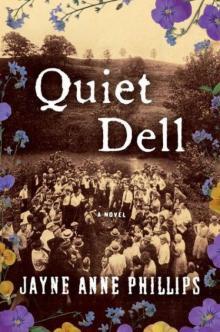 Quiet Dell: A Novel
Quiet Dell: A Novel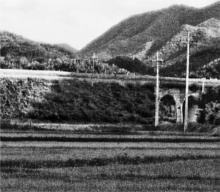 Lark and Termite
Lark and Termite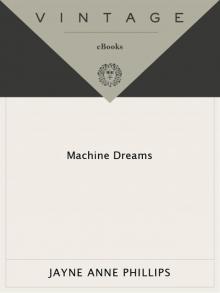 Machine Dreams
Machine Dreams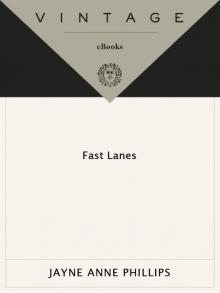 Fast Lanes
Fast Lanes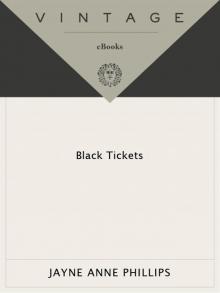 Black Tickets
Black Tickets